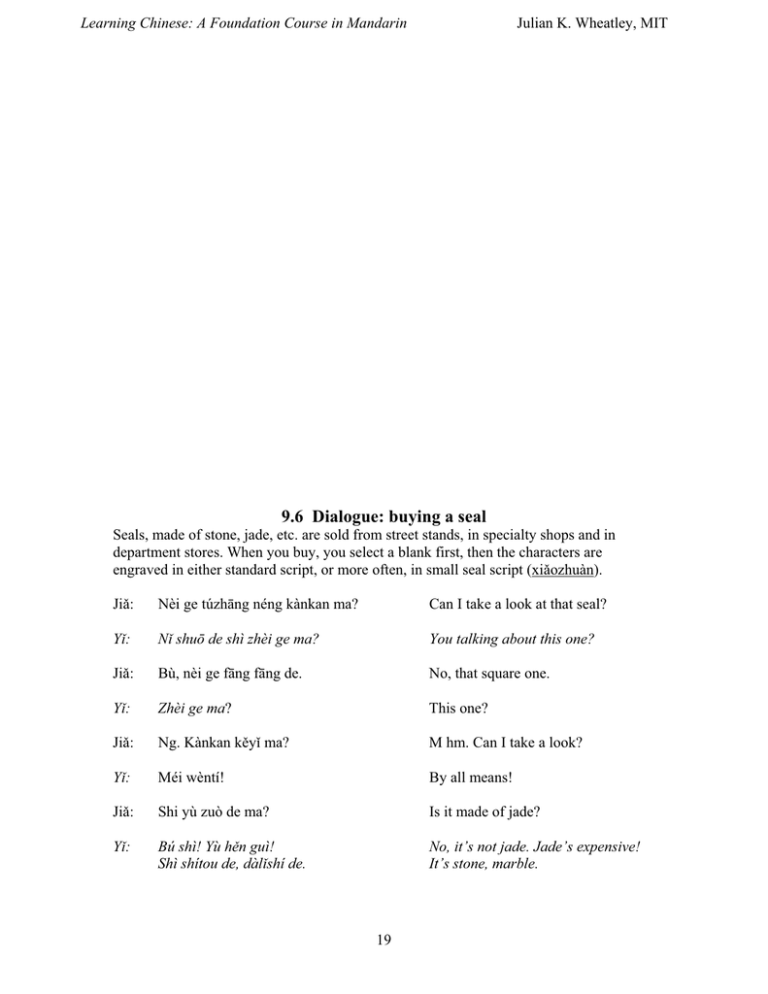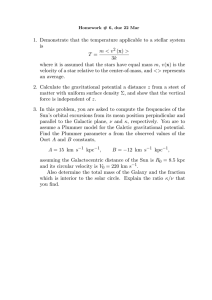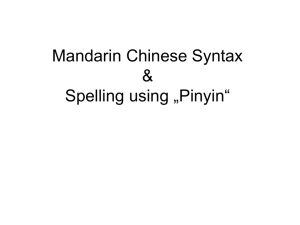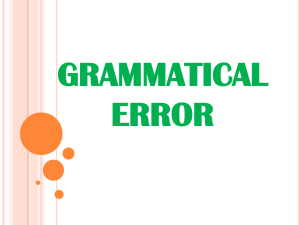9.6 Dialogue: buying a seal
advertisement

Learning Chinese: A Foundation Course in Mandarin Julian K. Wheatley, MIT 9.6 Dialogue: buying a seal Seals, made of stone, jade, etc. are sold from street stands, in specialty shops and in department stores. When you buy, you select a blank first, then the characters are engraved in either standard script, or more often, in small seal script (xiӽozhuàn). Jiӽ: Nèi ge túzhƗng néng kànkan ma? Can I take a look at that seal? Y: N shuǀ de shì zhèi ge ma? You talking about this one? Jiӽ: Bù, nèi ge fƗng fƗng de. No, that square one. Y: Zhèi ge ma? This one? Jiӽ: Ng. Kànkan kČyӿ ma? M hm. Can I take a look? Y: Méi wèntí! By all means! Jiӽ: Shi yù zuò de ma? Is it made of jade? Y: Bú shì! Yù hČn guì! Shì shítou de, dàlshí de. No, it’s not jade. Jade’s expensive! It’s stone, marble. 19 Learning Chinese: A Foundation Course in Mandarin Julian K. Wheatley, MIT Jiӽ: Nà, duǀshao qián? So, how much? Y: Èrshíw· kuài. ¥25. Jiӽ: Nà yàoshì kè zì hái yào qián ma? Is it extra if you engrave characters? Y: Yí ge zì w· kuài qián. It’s ¥5 a character. Jiӽ: Néng piányi diӽnr ma? Wԁ yào kè sƗn ge zì. Can you make it a bit less? I need 3 characters engraved. Y: Nà, shí’èr kuài. Yígòng sƗnshíqƯ kuài . Okay, ¥12. ¥37 all together. Jiӽ: S Ɨnshíwԃ ba! ¥35! Y: N g, ho, sƗnshíw·. Hm, okay, ¥35. Jiӽ: H ӽo, jiu zhèiyàng ba. Okay, that’s it then. gǀngyì: ‘handicrafts’ etc. zìhuà huƗpíng shànzi Črhuán xiàngliàn màozi yùdiƗo yádiƗo M-word scrolls (character-picture) vases (flower-bottle) fans (ear-rings) necklace (nape-chain) hat jade carving ivory carving zhƗng gè bӽ (hand fan) duì (pair); zhƯ (one of pair) tiáo dӿng gè gè shapes and textures yuán <yuán> de cnj <cnj> de guƗnghuá de round rough smooth material sùliào de mùtou de zhƝnsƯ de bù de yínzi de plastic wooden [real] silk cloth silver shítou de xiàngyá de zhӿ de jƯnzi de qƯngtóng de 20 stone ivory (elephant-tooth) paper gold bronze (green copper) Learning Chinese: A Foundation Course in Mandarin Julian K. Wheatley, MIT Seals for sale, Tianjin. 9.7 The BӼ (ԯ) construction In Chinese, shifting the position of objects – things affected or effected by the verb – may produce subtle shifts in meaning that are either achieved in other ways in English, or not explicitly acknowledged at all. For example, in some cases the object (the thing affected – the window – in the following example) may follow the verb, much as in English: 1 Qӿng dӽkƗi chuƗnghu. Yjing dkƗi le. Open a window please. [any window] [I] already have. Here the speaker is not designating a specific window – any window will do. But if the speaker wants to indicate a specific window, then he is more likely to say: 2 Qӿng bӽ chuƗnghu dӽkƗi. Wǂ yjing b tƗ dkƗi le. Please open the window. [a specific one] [I]’ve already opened it. Instructions that involve manipulation of particular items almost always elicit the grammatical word bӽ (ԯ) [or its more formal counterpart, jiƗng (/)]. Bӽ, which derives from a verb meaning ‘to take’, serves to spotlight a following phrase referring to an item that is to be moved, taken, broken, prepared, hidden, painted, purged, promoted or otherwise affected or changed in some way. For that reason, bӽ is typically associated with verb-combos (action plus result), or at very least, verb-le (action done) or a reduplicated verb (qiƝqie ‘cut up’). For the same reason, bӽ is not elicited by verbs like xӿhuan or kàn, which do not have a similar effect on their objects: Wǂ hƟn xƱhuan nèi bù diànyƱng. Wǂ yƱjing kànwán-le nèi bƟn shnj. I love that movie! [no bӽ] I’ve finished reading the book. [no bӽ] Nor does bӽ appear with potential verb combos, for which the effect is not actual, only imagined: 21 Learning Chinese: A Foundation Course in Mandarin [no bӽ] [with b] TƗ nèi jiàn xiƗngzi wǂ nábuqӿlai. Wǂ bƗng nƱ b tƗ náqlai. Julian K. Wheatley, MIT I can’t lift that suitcase of hers. I’ll help you lift it. The bӽ phrase almost always refers to particular items, so that in many cases the difference between a sentence with bӽ and one without is, as examples 1 and 2 [above] show, a question of whether the object is definite (‘the window’) or not (‘a window’). Other examples: 3. Qӿng bӽ mén dӽkƗi. W΅ yjing b mén dkƗi le. Please open the door. I’ve already opened it. 4. Yԁu diӽnr hƝi, qӿng bӽ dƝng dӽkƗi. It’s a bit dark, put the light on, please. DƝng huài le, dbukƗi. The light’s broken, [it] won’t go on. Nà, wԁmen bӽ zhuǀzi bƗndào chuƗnghu nàr, hӽo bu hӽo? Well then, let’s move the table over to the window, okay? Tài zhòng le, bƗnbudòng. It’s too heavy, [it] can’t be moved. Nà, bӽ táidƝng náguolai ba. Okay, then let’s bring the desk-lamp over here. Qӿng bӽ lóng nèi ge zì xiČ zài hƝibӽn shàng. Please write the character for dragon on the blackboard. Ho, w΅ b lóng nèi ge zì xiČ zài hƝibn shàng le. Okay, I’ve written the character for dragon on the board. XiČ+de hČn hӽo. Xiànzài bӽ fèng zì xiČ zài hƝibӽn shàng. [You]’ve written [it] very nicely. Now write the character for phoenix on the board. Ho, wǂ b fèng nèi ge zì xiČ zài hƝibn shàng le. Okay, I’ve written the character for phoenix on the blackboard. 6. Shéi bӽ wԁ de píjiԃ hƝ le? Méi rén hƝ-le n de píji·! Who drank my beer? No one’s drunk your beer! 7. Nӿ xiƗn bӽ niúròu qiƝqie. ZČnme qiƝ, qiƝ piànr háishi qiƝ kuàir? First slice the beef. How? Into slices, or into pieces? 5. 22 Learning Chinese: A Foundation Course in Mandarin 8. Julian K. Wheatley, MIT Qӿng bӽ zìxíngchƝ fàng zài xiӽoxiàng lӿ le. Please put your bike in the alley. [with le marking a ‘change of state’] Fàng zài xioxiàng l gòu Ɨnquán ma? Will it be safe enough if I put it there? Méi wènti, wԁ huì bƗng nӿ kƗn-zhe. No problem, I’ll help you to keep an eye on it. Notes a) Example 8 suggests how the sense of the modern function and properties of b can be adduced from ba’s original function as a verb meaning ‘take’, ie from ‘Take your bicycle and put it in the alley’ to ‘put your bicycle in the alley’. b) Note kƗn-zhe, with level tone on kƗn when it means ‘tend; watch over’ (still written ఘ), eg kƗn háizi ‘babysit children’. As a vestige of its verbal origins, bӽ can be directly negated or modified by adverbs: TƗ méi bӽ chuƗnghu dăkƗi. She didn’t open the windows. TƗmen yƱjing bӽ dǀngxi názԁu le. They’ve already taken the things out. Bié bӽ shnjbƗo fàng zai zhuǀzi shàng. Don’t put [your] bookbags on the table. 9.7.1 Making tea Instructions are a prototypical site for ba-phrases, because instructions involve picking particular objects from a set and doing things with them. Here, for example, are instructions for making a cup of tea. The master brewer makes reference to the following items: shuӿ shuӿhú huԁ chábƝi water kettle fire teacup cháyè tea leaves hé box bƝizi cup gàizi top; a cover And then performs the following operations on them – all of which involve complex verbs (or in one case, a verb followed by a zai-phrase). dàojìn fàng zài pour-in put in shƗokƗi boil-open zhԃnbèihӽo náchnjlai prepare-well take-out fàngjìn put-in gàishàng cover-on And (s)he instructs as follows: Bӽ shuӿ dàojìn shuӿhú lӿ, bӽ shuӿhú fàng zài huԁ shàng, bӽ shuӿ shƗokƗi. Ránhòu bӽ chábƝi zhԃnbèihӽo, bӽ cháyè cóng cháyèhé lӿ náchnjlai, fàngjìn 23 Learning Chinese: A Foundation Course in Mandarin Julian K. Wheatley, MIT chábƝi lӿ, bӽ shƗokƗi le de shuӿ dàojìn bƝizi lӿ, ránhòu bӽ bƝizi de gàizi gàishàng; liӽng fƝn zhǀng yӿhòu nӿ jiu kČyӿ hƝ le. Notes Dàojìn ‘pour-into’ and fàngjìn ‘put-into’ are both followed by places: dàojìn shuӿhú lӿ; fàngjìn chábƝi lӿ. In such cases lái or qù is either postponed until after the place (dàojìn shuӿhú lӿ qù), or as here, simply omitted. Exercise 4 Paraphrase the following in Chinese: It’s rather late – almost time for dinner. In the living room, there are a couple of students sitting on the sofa, one tall with blond hair, one short with black; both are wearing glasses. In front of them is a table; and laid out on the table are a set of boxes (yí tào hézi) of different colors (bù tóng yánsè) and different sizes (bù tóng dàxiӽo). The tall guy picks up the largest red box and puts the smaller yellow one inside it. Then the shorter guy picks up the green box and puts it in the yellow one. When they’ve finished putting all the boxes (suԁyԁu de hézi) back, they stand up, and walk out. That’s it! Nothing else. ________________________________________________________________________ 9.8 Verb Combos (3) The topic of b is, as noted, intimately connected to complex verbs, so this is an appropriate place to continue the complex verb survey. First a review exercise. Exercise 5 Fill in the gaps below with one of the listed verb complements (actual or potential – the latter with inserted bu or de): wán and hӽo ‘finish’, dào and zháo ‘manage to; succeed in’, bӽo ‘filled’, and cuò ‘in error’. 1. Kèrén yào lái le, nƱ fàn zuò _______ le méiyou? 2. NƱ zhӽo nƟi wèi? / DuìbuqƱ, wǂ yƟxǎ dӽ _______ le. 3. TƗ shuǀ de huà nƱ tƱng _______ ma? 4. Téng lăoshƯ zài chuƗnghu wàitou, nƱ méi kàn _______ tƗ ma? 5. Nèi bƟn shnj tài cháng le, wǂ kàn _______ . 6. Wǂ xiӽngdào kăoshì de shìqíng jiu shuì _______ jiào! 7. TƗ xiӽng zuò de shì yƱjing zuò _____ le. 8. Wǂ de zìdiӽn zhӽo _______! NƱ kàn ______ le ma? Méiyou zìdiăn bù néng zuò jƯntiƗn de gǀngkè! 9. Bié kèqi, duǀ chƯ yìdiănr cài! / Ài, wǂ chƯ _____ le, bù néng zài chƯ le! 10. JƯntiƗn hƟn mƝn, kàn ______ tàiyáng! ________________________________________________________________________ 24 Learning Chinese: A Foundation Course in Mandarin Julian K. Wheatley, MIT 9.8.1 Position of objects As noted earlier, bӽ is associated with manipulation or other kinds of actions that affect the position or integrity of objects: TƗ bӽ bӿ náqӿlai le. TƗ bӽ huà náxiàlai le. She picked up the pen. He lifted the painting down. However, an indefinite object (one that is new to the discourse – and in English typically preceded by an ‘indefinite article’ such as ‘a~an’ or ‘some’) often appears after the verb combination. Lái and qù, whose function is to indicate direction towards or away from the speaker, are often – but not always – postponed until after the object. TƗ náqӿ bӿ lai le. She picked up a pen. Wԁ xiӽngbuqӿ tƗ de míngzi [lai] le. I can’t remember his name. 9.8.2 More verb complements a) Zhù, which as a verb means ‘live’, combines with verbs such as jì ‘note’, ná ‘hold’, and tíng ‘stop’ to convey permanence: TƗ de diànhuà hàomӽ wԁ lӽo jìbuzhù! I can never remember his phone number. TƗ hČn cǀngmíng, nӿ wènbuzhù tƗ! He’s smart, you won’t stump him! Názhù le ma? Got it? Wԁ nábuzhù! I can’t hold it! JiƝzhù! / JiƝzhù le! Catch it! / Got it! Zhànzhù, bú yào dòng! Jԃqӿ shԁu lai! Stay still, don’t move. Put your hands up! Notes a) Wènbuzhù, literally ‘ask-not-stick’; or wènbudӽo ‘ask-not-collapse’. b) JiƝ ‘join’, as in Xièxie nӿmen lái jiƝ wԁmen. c) Dòng ‘move’, yùndòng de dòng. d) Jԃ ‘raise’; cf jԃzhòng ‘lift weights’ or jԃxíng ‘take place. For ‘put your hands up’, a version with bӽ is also possible: Bӽ shԁu jԃqӿlai! b) KƗi as a verb complement means ‘open’: KƗibukƗi ~ dӽbukƗi chuƗnghu. I can’t open the window. ZԁukƗi! Zhèr méiyou nƱ de shìr. Get lost; this doesn’t concern you. 25 Learning Chinese: A Foundation Course in Mandarin Yú líbukƗi shuӿ ya, guƗ líbukƗi yƗng; rénmín qúnzhòng líbukƗi gòngchӽndӽng! Julian K. Wheatley, MIT Fish can’t leave the water, melons can’t leave the vine; the people can’t be separated from the Communist Party! c) Shàng and xià, in addition to their literal meanings in the directional complements xiàlai and shànglai, xiàqu and shàngqu, also form single syllable complements: Bӽ qiƗng fàngxià! Put the gun down! Zhèi jiƗn jiàoshì zuòbuxià sƗnshí ge rén. This classroom won’t seat 30. Zuòxià ba. Why don’t you sit down. Wԁ wàng le dàishàng biӽo. I forgot to put my watch on. TƗ pà tƗ kӽobushàng dàxué. He’s afraid he won’t pass the university entrance exam. TƗ zhƝn kČ’ài; wǂ yƱjing àishàng tƗ le! She’s so cute; I’ve already fallen in love with her! XiƗngzi tài xiăo le, fàngbuxià dǀngxi. This case’s too small; I can’t get the things in. d) Zԁu ‘leave’ appears as a complement meaning ‘away’: TƗmen yӿjing bƗnzԁu le. They’ve already moved away [from here]. Shéi bӽ wԁ de yàoshi názԁu le? Who’s gone off with my keys? DǀngtiƗn lái le, niӽo dǀu fƝizԁu le. Méi guƗnxi, nio shi sìhài zhƯyƯ, z΅u jiu z΅u ba. Winter’s here, and the birds have all flown. Never mind, birds are one of the 4 pests, [if] they’ve gone, they’ve gone. 9.8.3 Specialized forms a) A number of complements appear only in the potential form. QƱ – qƱlái de qƱ – is one. As a complement, it shows a considerable shift in meaning to ‘worthy of’ or ‘afford to’: DuìbùqƱ. Sorry. (‘face-not-worthy’) Aiya, xiànzài BƟijƯng de shƝnghuó fèiyong tài gƗo le, wǂ kČ zhùbuqƱ! Gosh the cost of living in Beijing is too high – I can’t afford to live here. 26 Learning Chinese: A Foundation Course in Mandarin Yànwǀ, yúchì zhèi lèi de dǀngxi tài guì le; wǂ chƯbuqƱ! Julian K. Wheatley, MIT Things like birds nest soup and shark fin are too expensive; I can’t afford to eat them. b) It is also possible to choose to use the potential framework but not to commit to a particular complement. In such case, a default complement, liӽo (written with the same character as le, ೫) is available. Unlike most of the other verb complements, it combines with almost any action verb. It usually suggests ‘more than one can be expected to do’: Dǀngxi tài duǀ le, wǂ yí ge rén zƟnme nádeliӽo ne? Wǂ lái bƗng nƱ ná ba. [I have] too many things; how can I carry them all by myself? Let me help you. Zhème duǀ cài, wǂ yí ge rén zƟnme chƯdeliӽo ne? Such a lot of dishes, how can I eat them all by myself? Chàbuliӽo duǀshao. There’s hardly any difference; [they’]re more or less the same. (‘lack-not-able much’) ChƝ tài duǀ le, wǂmen wǎ diӽn dàobuliӽo. D ge diànhuà gàosu tƗmen, hăo bu hăo. Too many cars, we won’t be able to make it by 5. Phone them and let them know, okay? c) Semantic extensions Verb complements, particularly the directional ones, often have extended meanings. Qӿlái, for example, which as a directional complement means ‘up [here]’ (eg zhànqӿlai), also functions much more abstractly, in the sense of ‘when it comes to [doing]’: Zhèi jiàn shì shuǀqӿlai róngyì, zuòqӿlai nán. This is easy to talk about, but tough to do. Zhèi tiáo lù, kànqӿlai hƟn jìn, zuqӿlai hƟn yuăn. This route looks short, but when you walk it, it’s quite far. ShàoxƯnghuà tƯngqӿlai hČn xiàng Shànghӽihuà. Shaoxing dialect sounds like Shanghainese. [‘when you come to listen to it…]’ 27 Learning Chinese: A Foundation Course in Mandarin Julian K. Wheatley, MIT Exercise 6 Do[or write what you would say for] the following in Chinese. If the comment is not about yourself, you should address the ‘him’, ‘her’, or ‘them’ as indicated: 1. Ask him to come down and take a look. 2. Ask him to bring the books in. 3. Ask them when they are moving in. 4. Ask her to bring the books up here. 5. Ask her to come out and take a look at the view. 6. Ask her to drive the car over and pick the students up. 7. Say that someone seems to have taken your bookbag by mistake. 8. Explain that you can’t affort to eat seafood – because it’s so expensive. 9. Explain that your car won’t seat 7 – suggest taking 2 cars. 10. Explain that you’re full, and can’t eat any more. 11. Explain that you can’t remember his name. 12. Explain that you can’t open the door – it’s locked. _____________________________________________________________________ 9.9 Peking Duck Preparing Peking duck, a conversation done in the style of a xiàngshƝng ‘cross talk’ comedy routine. Jiӽ is the joker, yƱ is the straightman: Jiӽ. NƱ huì zuò BƟijƯng kӽoyƗ ma? Can you cook Peking duck? YƱ Bú huì! Nope! Jiӽ. Tài hăo le. Wǂ jiƗo nƱ. XiƗn zhӽo yì zhƯ yƗzi lái. Great; I’ll teach you. First, find a duck. YƱ Zhăobudào ~ zhobuzháo. I won’t be able to. Jiӽ. Nà, nƱ qù mӽi yì zhƯ ba! In that case, go and buy one, okay? YƱ Mibuq. I can’t afford to. Jiӽ. Nà, wǂ sòng (gƟi) nƱ yì zhƯ ba. Okay then, I’ll give you one. YƱ Duǀxiè. Thanks. Jiӽ. Nà, nƱ xiƗn bӽ yƗzi xӿgƗnjìng! Well, first clean the duck! YƱ Hăo, xƱ yƗzi. Okay, clean duck. Jiӽ. Ránhòu bӽ cǀng jiƗng fàngjìn yƗ dùzi lƱ qu. Afterwards put the scallions and ginger in its stomach. 28 Learning Chinese: A Foundation Course in Mandarin YƱ Hăo, fàng cǀng jiƗng. Julian K. Wheatley, MIT Okay, put in scallions and ginger. Jiӽ. Xiànzài bӽ yƗzi fàngjìn kӽoxiƗng lƱ qu. Now put the duck in the oven. YƱ Hăo, ko yƗzi. Okay, roast the duck. Jiӽ. XiӽoxƯn, bié kӽohú le. Careful, don’t burn it. YƱ FàngxƯn, kăoshì kodehú, koyƗ, kobuhú. Don’t worry, I only ‘burn out’ on exams, I don’t burn ducks. Notes a) XiàngshƝng ‘cross talk’, a popular style of comedy that involves a lot of language play; usually involving two people, one of whom plays straight to the wit of the other. b) Sòng ‘to present; escort’; sòng, like gƟi, can take both person and thing as objects. More often, however, it is followed by gƟi: sòng gƟi; cf. mài gČi ‘sell to s/o’ (but with mài, gƟi is not optional). c) XiƗn, Adv ‘first’. d) XiӽoxƯn ‘careful (small-heart)’; cf. fàngxƯn ‘take care (put-heart)’. e) The routine ends in a play on kӽo ‘to test’ and kӽo ‘to bake’; hú is a SV meaning ‘to burn [food]’, but in slang, it also means ‘to fail an exam’. 29 MIT OpenCourseWare http://ocw.mit.edu 21G.103 Chinese III (Regular) Fall 2005 For information about citing these materials or our Terms of Use, visit: http://ocw.mit.edu/terms.








